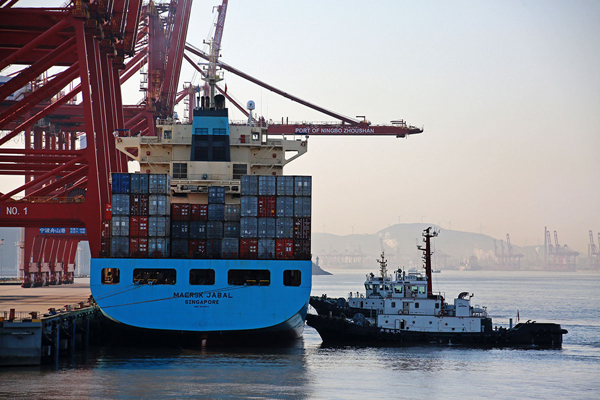Zhejiang outranks Shanghai in latest foreign trade volume

A container ship anchors at Ningbo-Zhoushan Port in Zhejiang, waiting to be unloaded. [Photo by Yao Feng/For China Daily]
East China's Zhejiang province's foreign trade volume unprecedentedly surpassed Shanghai's and ranked third among all provincial-level regions over the first two months of this year, according to the latest data from the Hangzhou customs office.
The province had long followed Shanghai and maintained fourth place in the trade ranking in previous years.
Between January and February, Zhejiang's foreign trade was valued at 571.46 billion yuan ($87.89 billion), up 42.4 percent year-on-year. Its imports surged 50.1 percent year-on-year to 423.55 billion yuan, while its exports grew 24.1 percent to 147.91 billion yuan.
The European Union, the United States, and ASEAN continued to be the province's three largest trading partners in the period.
Zhejiang's trade with countries involved in the Belt and Road Initiative and the 15 Regional Comprehensive Economic Partnership (RCEP) countries respectively rose 34.4 percent and 36.8 percent to 197.05 billion yuan and 143.46 billion yuan. Zhejiang's trade with Central and Eastern European Countries (CEEC) stood at 17.97 billion yuan, up 33.7 percent from the previous year.
Largely due to the increased imports of iron ore from Brazil, Zhejiang's total imports from Latin America shot up 58.2 percent in the period, which made the region replace the EU as the province's second largest source of imports.
Zhejiang's imports from the EU and the US surged 32.8 percent and 140 percent respectively.
Zhejiang saw an increased proportion of machinery, electronic, and high-tech products in its exports. The amount of machinery and electronic product exports in the period stood at 197.53 billion yuan, up 62.5 percent from the previous year, making up 62.5 percent of the total exports, while high-tech product exports amounted to 36.25 billion yuan, up 73.6 percent, making up 8.6 percent of the total.





 play
play